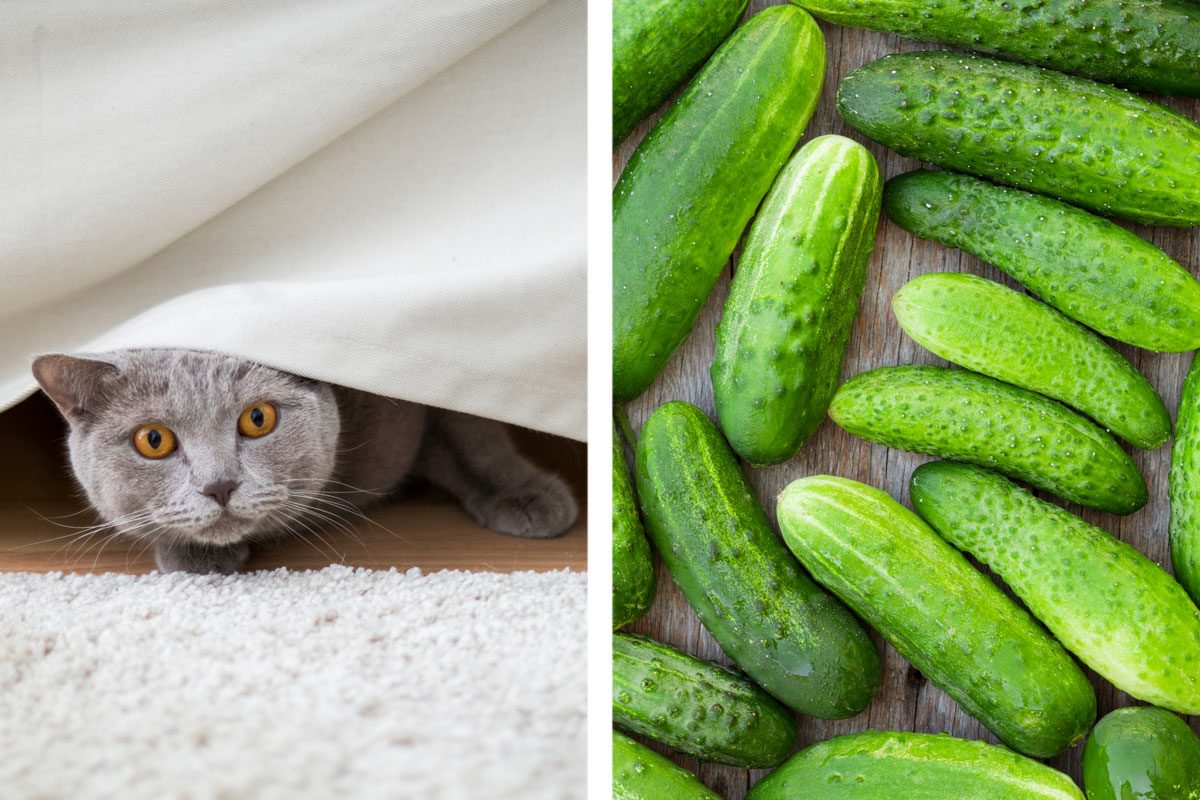There’s a reason why cats don’t like cukes—and why you should think twice about attempting to scare your own kitty with one

Here’s Why Cats Are Afraid of Cucumbers

If you’ve spent any time on the internet, chances are, you stumbled upon viral videos of cats encountering cucumbers. Their reactions aren’t what you might expect: You’ll see cats leaping into the air or sprinting away at the sight of the innocuous green fruit.
At first glance, these videos are seemingly hilarious. Pet owners secretly place cucumbers behind their unsuspecting cats and film their reactions. When the cats turn around, they’re startled by the fruit and often leap back in fright—or run for their lives, as if you’re about to give them a bath. It’s hard not to laugh when you see these tiny predators petrified of something as ordinary as a salad topper.
So why are cats afraid of cucumbers? There’s more to this odd cat behavior than meets the eye. We spoke to two vets to find out the reasons why cats don’t like cucumbers.
Get Reader’s Digest’s Read Up newsletter for more pets, humor, cleaning, travel, tech and fun facts all week long.
Why are cats afraid of cucumbers?
While there isn’t one definitive answer, vets and animal behaviorists have a few theories about why cats don’t like cucumbers.
The cucumber startles the cat
One explanation as to why cats don’t like cucumbers is that the sudden appearance of the cuke is behind your furball’s fear. Think about what happens when someone sneaks up behind you: You jump!
“If the cat turns around and suddenly sees a cucumber there, it causes them to become frightened and jump,” says Claudine Sievert, DVM, a Kansas-based veterinarian. “If you’ve ever watched your cat, you’ll know that he’s aware of everything around him, and if something moves suddenly or unexpectedly, he will react to it. His eyes will widen, and his entire body goes on high alert.”
Wailani Sung, PhD, DVM, DACVB, a San Francisco–based veterinary behaviorist and the author of Decoding Your Cat, agrees. If a cucumber shows up out of nowhere while a cat is eating or relaxing, their instinct is to react first and investigate later. “The immediate reflexive response is danger, so run, move, get out of there. ‘Fight or flight’ is turned on,” explains Dr. Sung. “After the cat is a few feet away, their brain may finish processing the information and realize that it may be an unfamiliar object but does not actually pose a risk.”
This feline reaction isn’t unique to cucumbers. Rather, it’s a response rooted in surprise. The appearance of any strange object, like plastic bags or toys, can produce a similar reaction if it is introduced abruptly. Cats don’t expect a large, foreign object to suddenly appear in their space, particularly near places they associate with safety, like around their food bowls.
To put it into context, imagine yourself peacefully enjoying a relaxing afternoon on the couch when suddenly, out of nowhere, a giant rubber spider drops from the ceiling. You might jump out of your skin too!
They may mistake the cucumber for a snake
“Some breeds of snake are predatory of cats and have been known to attack and even eat cats,” explains Dr. Sievert. “Cats see an elongated green object and think it’s a snake, so they run from it.”
Is it OK to scare cats with cucumbers?
While the internet may find these cat-versus-cucumber videos entertaining, experts caution against scaring your pet with cukes—or any other object, for that matter. Such pranks can cause physiological and behavioral stress responses and could lead to anxiety or injury.
“People seem to think it is funny to scare their cats, which I find kind of mean and insensitive. Traumatic events can cause or escalate a pet’s level of anxiety,” says Dr. Sung.
Your cat may associate its favorite location in the house with the frightening event—or it could even become fearful of you. Instead of playing pranks, focus on creating positive, engaging experiences for your feline friend. Get it new toys or scratching posts, give it a box to hide in or plan interactive play sessions to stimulate its natural curiosity in a safe and respectful way.
Cats didn’t sign up for your viral pranks—so stop terrorizing them for likes.
FAQs
Do all cats react to cucumbers the same way?
No, not all cats are afraid of cucumbers. Some might not react to them at all, while others could be mildly curious. A cat’s reaction often depends on its personality, past experiences and how comfortable it is in its surroundings.
Can repeatedly scaring a cat with cucumbers affect its behavior?
Yes, repeated exposure to such pranks and scares can lead to chronic stress in cats. And that, in turn, can result in changes in appetite, increased aggression, hiding or even worse health issues.
What should I do if my cat seems too skittish?
If your cat is easily startled, try to create a calm environment and avoid any sudden movements. A vet or animal behaviorist can also help you identify the underlying reason for your pet’s anxiety.
About the experts
|
Why trust us
At Reader’s Digest, we’re committed to producing high-quality content by writers with expertise and experience in their field in consultation with relevant, qualified experts. We rely on reputable primary sources, including government and professional organizations and academic institutions as well as our writers’ personal experiences where appropriate. We verify all facts and data, back them with credible sourcing and revisit them over time to ensure they remain accurate and up to date. Read more about our team, our contributors and our editorial policies.
Sources:
- Claudine Sievert, DVM, Kansas-based veterinarian
- Wailani Sung, MS, PhD, DVM, DACVB, FFCP, is a board-certified veterinarian specializing in animal behavior.























